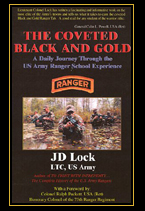RANGER SCHOOL: FLORIDA PHASE
The third and final phase of Ranger School is conducted at Camp James E. Rudder…Auxiliary Field #6…at Eglin Air Force Base, Florida, by the 6th Ranger Training Battalion. Considered the most extreme in terms of physical and mental stress, Camp Rudder exposes the Ranger students to the harsh and oppressive environment of the Florida jungle and swamp where they will learn boat drills, make rope bridges, and negotiate rivers and swamps. This final phase is the toughest and most demanding. Exhausted and emaciated, only the toughest and most dedicated Rangers usually see it through to the end.
The first day of the phase begins with outdoor classes to review patrol base operations, duties and responsibilities of platoon leaders and platoon sergeants, and the mechanics of zone reconnaissance. The Ranger cadre review and demonstrate ambush and raid techniques prior to introducing the students to movement-to-contact tactics. This day is closed out with a live demonstration of snakes and alligators and a discussion of how to identify and avoid the reptiles. For those who may fail to avoid them, we were also trained on how to treat snakebites.
The second and third days are spent in the field. Attrited to platoon size, the companies spend the two nights in a patrol base while practicing their ambushes, raids, and movement to contacts during the day.
On the fourth day, the training moves to the water environment where the students train on stream crossings and small-boat operations. All initial water operations begin with land training to get the sequence and timing down. Once the RIs feel the unit is competent enough, squad sized elements load aboard Zodiac boats and, accompanied by RIs, paddle to a patrol base in the swamp where they will spend the night.
Commencing that evening with the issuance of an Operations Order, the nine-day field exercise in the swamp begins. Crossing rivers with one rope bridges, paddling up and down the rivers in their Zodiacs, or riding about in helicopters and C130s, the Ranger students will conduct reconnaissance, ambush, raid, airborne, and air assault missions.
The field training exercise and the Ranger course itself ends with a predawn amphibious assault across the Gulf of Mexico onto Santa Rosa Island. Beginning their assault preparations around 1600 hours, each company plans and rehearses for a coordinated attack. Embarking late that evening, the force hits the beach around 0400 where it is met by defenders who force the Ranger students to fight their way ashore.
Nearly sixteen days after arrival in Florida and having completed the amphibious assault and final after action review, the Ranger students are within days of receiving the Coveted Black and Gold. Clearing Camp Rudder and returning to Camp Rogers at Ft. Benning, the cycle is complete and graduation is in sight.
Next: Read about a day in the life of a Ranger student going through the Florida Phase.
Excerpted from The Coveted Black and Gold: A Daily Journey Through the US Army Ranger School Experience
© LTC JD Lock. Printed with permission.
The Coveted Black and Gold
 John Lock’s vivid description of the Ranger Course explains why it is the most physically, mentally, and psychologically demanding training provided in the U.S. Army. The purpose of this extremely grueling regimen is to develop combat skills of carefully selected and prepared officers and enlisted men. They are required to perform effectively as small unit leaders in a realistic tactical environment under the physical and mental stress approaching that of ground combat. They develop individual combat skills and abilities through the application of leadership principles. Tactical exercises also increase the Ranger trainee’s capability to plan and conduct dismounted infantry, airborne, airmobile, and amphibious independent squad and platoon-size operations. Graduates return to their units with the never-ending mission of sharing their knowledge and skills to build a better, more combat-ready Army. Receiving the Tab is only the beginning; a Ranger is expected to earn that Tab every day of his life.
John Lock’s vivid description of the Ranger Course explains why it is the most physically, mentally, and psychologically demanding training provided in the U.S. Army. The purpose of this extremely grueling regimen is to develop combat skills of carefully selected and prepared officers and enlisted men. They are required to perform effectively as small unit leaders in a realistic tactical environment under the physical and mental stress approaching that of ground combat. They develop individual combat skills and abilities through the application of leadership principles. Tactical exercises also increase the Ranger trainee’s capability to plan and conduct dismounted infantry, airborne, airmobile, and amphibious independent squad and platoon-size operations. Graduates return to their units with the never-ending mission of sharing their knowledge and skills to build a better, more combat-ready Army. Receiving the Tab is only the beginning; a Ranger is expected to earn that Tab every day of his life.
COL(Ret.) Ralph Puckett
Honorary Colonel of the 75th Ranger Regiment
